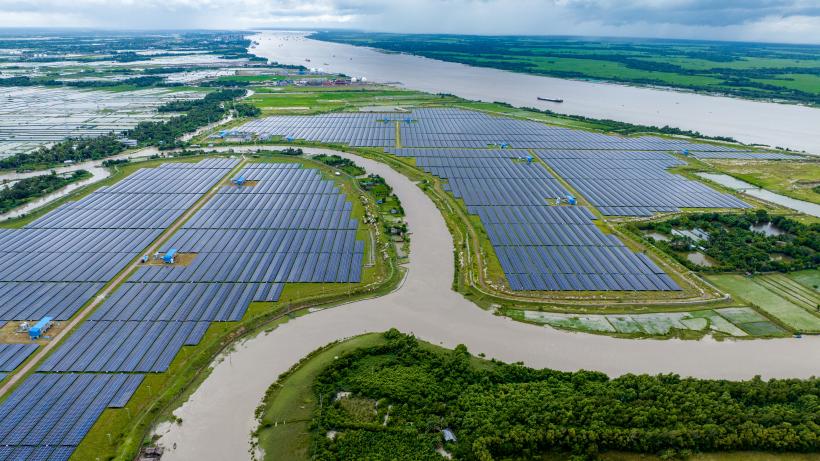
Innovation, growth, and the environment
IGC publishes its White Paper on innovation, growth, and the environment.
November 2023, London – A future where we can foster inclusive economic growth and tackle poverty in developing countries while protecting the natural environment is both possible and essential.
This is the message of the new white paper, “Innovation, growth, and the environment,” from the International Growth Centre (IGC), developed over two years through a series of consultations with IGC researchers and international collaborators in academia and policymaking.
The landmark publication identifies priority areas for research to inform the national policy choices in developing countries that will be needed to promote inclusive economic growth and higher standards of living while reducing environmental damage and vulnerability to climate change.
It comes at a pivotal moment. While economic growth has been a powerful force to improve lives, record-breaking extreme weather events disproportionately affect the poorest populations and there has been a surge in people living in poverty on less than US$ 3.65 a day. The real threat of reversing global progress towards ending extreme poverty, in part because of these interconnected issues, was a focus of the United Nations General Assembly, and calls are being made to increase support for the most fragile countries and communities affected by climate hazards, ahead of COP28.
“With 132 million people at risk of being pushed into poverty due to climate change, we need new, cross-cutting ideas about how to sustain economic growth whilst protecting the environment and reducing poverty”, stresses Robin Burgess, one of the four lead authors on the paper along with Stefano Caria, Tim Dobermann and Allegra Saggese. “This paper sets out a path for that, at a time when climate change has become one of the most pressing challenges for public policy.”
The white paper argues that innovation across six policy areas is key to achieving balance between the need for growth and need to protect the environment:
-
Clean energy - expanding affordable clean energy technology production and distribution
-
Conservation - preserving biodiversity and natural resources to minimise economic cost
-
Firm innovation - incentivising firm innovation through subsidies, taxes, and regulations
-
Labour markets - training and matching workers with jobs to reduce unemployment
-
Place and space - investing in eco-friendly cities, removing barriers to movement, and supporting rural areas affected by migration
-
Social protection - helping people to cover emergencies, to reduce risk and increase productivity
Drawing on a broad-ranging review of the economics and climate literature, the authors identify key policy challenges – and potential solutions – across these six areas.
This paper aims to encourage thoughtful dialogue and informed decision-making in this space. Jonathan Leape, the IGC’s Executive Director says, “The White Paper emphasises the importance of policy-focused economic research to the climate change agenda and underscores the IGC's commitment to funding demand-driven research that informs policymaking for sustainability in developing countries.”
ENDS
Authors
Robin Burgess (Director, IGC and Professor of Economics, LSE)
Robin Burgess is a Professor of Economics, Co-Founder and Director of the International Growth Centre and Director of the Economics of Environment and Energy Research Programme, all at the LSE. He is Co-Director (with Michael Greenstone) of the Coase Project on the Economics of Climate, Energy and Environment, was the past President of BREAD, serves on the Board of Voxdev and CEGA and is an Affiliate of J-PAL and Y-RISE, a Research Fellow in CEPR and CESifo and a Fellow of the British Academy and the Econometric Society. His main interests are in the areas of environmental economics, development economics and political economy and he is currently working in Bangladesh, Brazil, China, India, Indonesia, Kenya, Myanmar, Pakistan, South Korea and Uganda.
Stefano Caria (Professor of Economics, University of Warwick)
Stefano Caria is a Professor of Economics (University of Warwick); IGC Research Programme Director (Firms, Trade and Productivity); and IGC Lead Academic (Ethiopia). He is a Research Affiliate of J-PAL, CEPR and CAGE, an editor of VoxDev and a trustee of the Global Change Data Lab. In 2022, he received the Philip Leverhulme Prize in Economics. His research focuses on how to make labour markets more inclusive and more efficient.
Tim Dobermann (Researcher, LSE)
Tim Dobermann is a PhD student and researcher at LSE. He was previously Country Economist for IGC Myanmar and IGC Policy Economist for Bangladesh, Myanmar, Pakistan and Afghanistan. He holds an MSc in Economics from LSE and a BSc in Economics from University of Warwick.
Allegra Saggese (Policy Economist, IGC)
Allegra Saggese is a Policy Economist specialising in Energy and Sustainability at the International Growth Centre (IGC), where she leads the initiative mainstream climate and energy issues within the organization. She provides project support to researchers and policymakers on adaptation and resilience planning, energy access, electrification, biodiversity and low carbon industrialisation. She holds an MSc in Environmental Economics and Climate Change at the LSE and a BS in Environmental Economics from the University of California, Berkeley.
International Growth Centre
The International Growth Centre (IGC) works with policymakers in developing countries to promote inclusive and sustainable growth through pathbreaking research. We are a global research centre with a network of world-leading researchers, country teams across Africa, South Asia and the Middle East, and a set of global policy initiatives. Based at LSE and in partnership with the University of Oxford, we are majority funded by the UK Foreign, Commonwealth and Development Office (FCDO).
Contact information:
Annelise Andersen, Head of Communications, IGC
Email: [email protected]
You can read 'IGC White Paper: Innovation, growth, and the environment' here.

